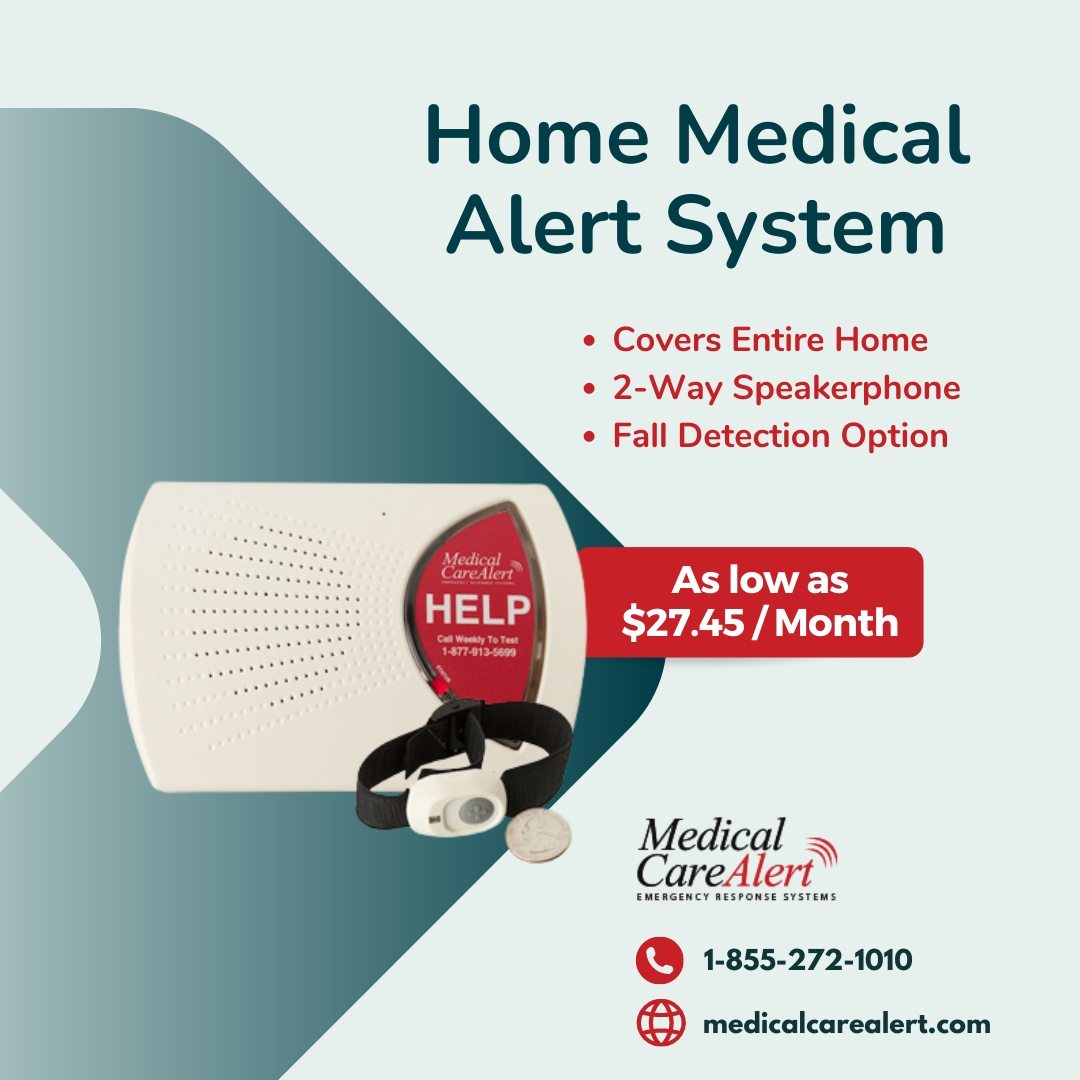- Features
- How It Works
- Video Overview
- Technical Specs
Product Description
HOME Emergency Medical Care Alert System
Features:
Maintain your independence at home with our HOME Medical Alert System. With our monitoring service we'll be there for you in an emergency when family and neighbors aren't around. There's nothing extra to buy, and no long-term commitment is required. Your price is locked in, guaranteed to never go up!
Perfect for folks who stay mostly at home and want to remain independent. Easy to set up by yourself in about 30 seconds— no installer needed!
What Our HOME Alert System Includes
 The HOME alert system from Medical Care Alert is a personal emergency response system designed for older adults. We've covered everything from communication to safety team access in the event of an emergency.
The HOME alert system from Medical Care Alert is a personal emergency response system designed for older adults. We've covered everything from communication to safety team access in the event of an emergency. Your HOME Medical Care Alert system subscription comes with:
- Whole-house two-way voice speakerphone console
- A versatile, shower-safe life-saving medical alert safety button with a choice of a wrist or necklace pendant setup
- Everything you might need for a landline connection setup — phone cord, phone jack splitter and DSL filter for landline phones. If no landline available, choose the “No Landline” cellular version instead.
- 24/7 monitoring by EMT/EMD certified agents
- Free lockbox to hide a key outside your home for medical professional emergency access
- Free USPS priority shipping with annual or semi-annual subscription payment plans
Add-On Features
In addition to the built-in features of our life-saving medical alert button system, customers have an option to add any of the following services to their HOME system:- Add Automatic Fall Detection AutoFALL Pendant**
- Add Cellular Connection if no landline phone
- Wall life-saving medical alert buttons available
- "Bling Bling" Jewelry pendant button holder available
Benefits of a Wireless Medical Alert System with Fall Detection
Our popular HOME medical alert systems with fall detection provides the peace of mind families need for older folks who want to maintain their independence at home. The HOME Medical Care Alert system provides a lifeline emergency alert and monitoring service to get you help when you need it.Specifically, our medical alert systems with fall detection have:
- Easy setup and installation: All you have to do is plug it in and turn it on. Our systems notify our Medical Alert Monitoring Center in case of power failure, low battery or phone line problems. Even if you are unaware of these issues, we have your back.
- Simple maintenance: Our sealed button batteries never need charging and can last five to seven years. Our systems are capable of supporting up to 16 additional buttons.
- Landline or cellular capabilities: Our systems are created to plug into your landline phone line or cable modem if your phone is bundled with your TV/internet. If you don't have a landline, the system also supports cellular modules with AT&T or Verizon. No personal cell phone, internet or Wi-Fi required.
- A sleek design: The wall device is small enough to fit in any space. The pendant is also sleek enough to fit discreetly under any clothing and is lightweight — 0.4 ounces each — for easy wearing.
- A wide connection range: Our systems allow a 1,000-foot range from the medical alert button to the base station — you can travel the distance of three football fields around your home and still have a signal!
- A sensitive microphone and whole-house speaker: Our HOME system console includes a sensitive microphone and whole-house speaker for accessible communication in an emergency.
Patent-Protected Medical Alert Systems
Automatic Fall Detection for the HOME and HOME-LTE systems is patented and protected by one or more of the following patents:- Fall detection and fall risk detection systems and methods. Patent No: 9,901,290; Issue Date: Feb. 27, 2018; Continuation of Patent No. 9,005,141
- Body movement monitoring device. Patent No: 8,109,890; Issue Date: February 7, 2012; European Patent No: 1,511,418; Issue Date: April 8, 2009
- Ambulatory system for measuring and monitoring physical activity and risk of falling and for automatic fall detection. Patent No: 8,206,325; Issue Date: June 26, 2012
- Ambulatory system for measuring and monitoring physical activity and risk of falling and for automatic fall detection. Patent No: 9,005,141; Issue Date: April 14, 2015; Continuation of Patent No. 8,206,325
- Fall Detection and Fall Risk Detection Systems and Methods: Appl. No: 14/659,446; Filing Date: March 16, 2015; Continuation of Patent No. 9,005,141, which is a continuation of Patent No. 8,206,325
Order Your Hospital-Grade HOME Medical Emergency Call System Today
At Medical Care Alert, your safety is our top priority. Place an order for your HOME Medical Alert System today, or contact us with any questions about our emergency response systems.HOME Technical Specifications
- Plug into a standard household power outlet. Power supply 100-230V primary, 10VAC secondary Backup power supply 6VDC, 1.2 Ah, NiMH rechargeable battery.Sufficient for at least 80 hours Current consumption 280 mA. 15 mA in standby Telephone connector Country specific Dialing procedure Tone, Pulse Max.
- number of transmitters 16 Max for landline version, 256 max for cellular version.
- number of telephone numbers 6 (including 2 technical alarms)
- Audio volume Preset by potentiometer and adjustable during conversation
- Protocols supported: Multiple protocols Programming Remote or by separate programming tool (PC)
- Programming languages English, German, Dutch, Spanish, Swedish Inputs/ outputs 3 inputs, 1 relay output (optional)
- Dimensions (H x W x D) 205 x 235 x 40 mm Weight 0.7 kg
- Button batteries never need charging.
- *NOTE: Fall detector does not detect 100% of falls. If able, users should always push their help button when they need assistance.
- The HOME system comes in two versions: a landline version, and a cellular version.
- If you have a standard phone line in the home (also known as a POTS line, for Plain Old Telephone Service) you can connect the HOME system to any working phone jack in the home.
- If you have telephone service bundled with your cable TV or Internet, then your phone service is through your cable modem and known as VoIP phone service (for Voice over Internet Protocol). The HOME system will work with your VoIP service if provided by a major carrier such as Comcast, Spectrum, AT&T, Cox, etc (not a complete list).
- If using VoIP service from your cable provider, the phone line actually exists in your cable modem. Your phone is connected to a port in your cable modem, typically labeled as "TEL1". Our HOME system will need to plug into that port on the back of your modem. Your phone line then connects to the cable modem using a splitter we provide, or alternatively the phone line can connect into the back of the HOME system console. Full instructions are provided.
- IMPORTANT: Certain VoIP phone service providers are NOT ACCEPTABLE and may NOT be used with ANY Medical Alert System. Examples include: Vonage, Ooma, MagicJack (not a complete list). These services are fine for voice, but NOT for Voice and Data as required by a medical alert system. Learn more about VoIP for Medical Alert systems here.
- No Landline? No problem! Choose the CELLULAR version of the HOME System. No personal cell phone, landline, internet, or Wi-Fi required.
- The HOME System with Cellular has its own 4G LTE cellular card built in, and can use either AT&T or Verizon networks. If you have a preference for one of those carriers specifically, just let us know when you order.
HOW OUR EMERGENCY RESPONSE SYSTEMS WORK:
- The HOME Medical Alert System is designed to get you help anytime you press the button.
- When you press the button, a signal is sent via your landline phone, or via built in cellular communcation to our Emergency Response Center. Our agents will know WHO and WHERE you are.
- We will talk to you over the 2-way voice speaker console and see what kind of help you need.
- You'll tell us if you need a family member, neighbor, or emergency services (police/fire/EMS). We'll get you the help you need.
- We then call your emergency contact list to notifiy them of the situation, and send text messages to their cell phones.
Buttons have a range of up to 1,000 feet from the base console, depending on environmental factors like building materials, etc. AutoFALL pendants have shorter range, up to 600 feet.
Voice range is 30-60 feet away from the base console. If we don't hear your voice after receiving an emergency signal, we'll call the home/cell phone listed to try to reach you that way. If we still don't speak with you, we'll dispatch help and notify your contact list.
Battery back up for landline-based HOME system is up to 72 Hours. Battery back up for cellular-based system is up to 24 hours.

Our HOME System protects you anywhere in and around your home, 24/7. It's perfect for folks who stay mostly at home, and want to remain independent. Best of all, it’s reliable, easy to use, and affordable. You can live alone, without feeling alone.
There are two parts to the HOME Medical Alert System - the wearable button, and the whole-house 2-way voice speakerphone console.
The speakerphone console is about the size of a hardback book. Plug it into power and plug it into your phone line. If you dont have a home phone line, we'll send you one with a cellular card built in.
You'll wear a small, lightweight button around your neck or on your wrist. It's waterproof, and OK to wear in the shower.
When you need help, just push the button.
We'll talk to you over the speakerphone console and ask if you need help. Just let us know what you need.
For example, you might say "I've fallen but am not hurt. Call my daughter". Not all calls require an ambulance and a fire truck.
But if you are hurt and need help, we'll dispatch EMS right away.
And then we'll call and send text messages to the people on your emergency call list to let them know whats going on.
By now you're probably thinking "what if I'm outside, or they can't hear me?"
If we get a signal for help and can't hear you, first we'll call your home phone or cell phone. If we don't reach you, we'll go ahead and send help right away.
OK. So now you may be thinking "well how are they going to get into the house to help me? Are they going to break down the door?"
That's where the lockbox comes in.
We include a lockbox to hide a key. When we dispatch EMS we let them know where the lockbox is located, and the 4 digit combination so they can get in.
Our hospital-grade HOME Medical Alert System provides you with peace of mind, knowing you can get help at the push of a button in an emergency. There is nothing to buy, and no long term commitments. And unlike other companies, your pricing is locked in, guaranteed to never go up!
The "Shower-Safe" waterproof HOME system buttons have up to a 1,000 foot range from the base unit - that’s three football fields! Buttons never need charging - internal batteries last up to 7 years, we'll notify you and send free replacement buttons if needed.
We alert Life Safety EMS when you need help, and notify your emergency contacts with calls and texts.
Order here or contact customer service to get started, click here to see more details.
















